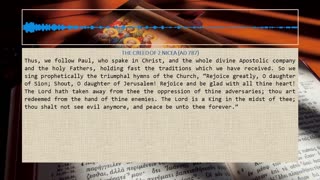Premium Only Content

Idol Killer Interview 1 What Is Penal Substitution? Reviewing PSA’s 17 Claims
Idol Killer host Warren McGrew brings Paul Vendredi aboard for this seven-part series examining the seventeen theological ideas underlying the larger doctrine called penal-substitutionary atonement (PSA).
Paul begins his examination by defining terms linked to PSA: atonement and propitiation. Atonement means reparation for a wrong or an injury. Propitiation means making a party who is ill-disposed toward us well-disposed by means of payment or bribery. However, as they dive deeper into the topic, the hosts acknowledge the complexity of the issue, as the term “atonement” in theological circles has a broader definition, leading to competing interpretations among Western and Eastern Christians. Not all traditions understand Christ’s death as reparation for a wrong or an injury, as some, like the “Restored-Icon Model,” view Christ’s work as a healing or restorative process. Despite this, all these theories are referred to as “atonement theories,” creating a confusing and chaotic situation where communication becomes challenging. The differences among the traditions notwithstanding, the hosts resolve always to bring the focus back to the common data set; namely, the life, death, and resurrection of Christ.
Using the Greek-language Septuagint translation (LXX), Paul shows that human beings were created as God’s icons. However, human beings--as broken icons because of sin--lost their immortality. Church Fathers like Gregory of Nazianzus see this as the reason why the second person of the Trinity became incarnate, restoring the icon by attaching all aspects of humanity to his divinity.
The hosts then discuss the origins of PSA in the writings of Augustine and Anselm, two figures revered in Western Christianity. While acknowledging the brilliance of these two men, Paul critiques their soteriology, rejecting PSA while offering the Restored-Icon Model as a more comprehensive explanation of the data.
Paul then outlines the 17 ideas that compose PSA:
1. Because Adam is mankind’s federal head, all men are guilty of Adam’s sin (Original Sin)
2. As a result of Original Sin, all mankind are now totally depraved
3. Even infants--innocent of actual sin--are guilty of Original Sin and are therefore totally depraved
4. All sin infinitely offends God because the gravity of a sin depends on the status of the one offended
5. All sin is to be thought of as a debt that mankind owes to God for having robbed him of honor
6. Even infants owe God this debt
7. God instituted the Old-Testament sacrifices because this debt can only be paid with blood
8. God could have cancelled mankind’s debt simply by willing it--
9. But God is strictly just and cannot forgive a debt without first collecting it from an alternate source
10. Because the Fall was as easy as possible, the atonement for that fall must be as costly and painful as possible
11. The only commodity valuable to recompense God for his offended honor is the shed blood of a god-man
12. So the Son of God becomes incarnate as Jesus of Nazareth so that his human nature can suffer and die as mankind’s substitute
13. God pours out his wrath on the crucified Christ, transferring Christ’s righteousness to mankind; mankind’s wickedness, to Christ
14. The crucified Christ becomes a literal curse and the embodiment of sin
15. His eyes too holy to look upon sin, God turns his back on Christ, abandoning him
16. As the perfect, unblemished sacrifice, Christ satisfies God’s wrath against sin once and for all, thereby obviating any further need for blood sacrifices
17. The death of Christ ransoms mankind from the wrath of God
-
 4:25
4:25
Paul Vendredi
2 months ago2 Nicea
11 -
 LIVE
LIVE
TimcastIRL
46 minutes agoTrump Orders Specialized National Guard Units To Combat Crime In Cities, Dems Furious | Timcast IRL
22,549 watching -
 LIVE
LIVE
Barry Cunningham
2 hours agoPRESIDENT TRUMP MADE TODAY A VERY BAD DAY TO BE A DEMOCRAT!
3,172 watching -
 LIVE
LIVE
Glenn Greenwald
3 hours agoIsrael Slaughters More Journalists, Hiding War Crimes; Trump's Unconstitutional Flag Burning Ban; Glenn Takes Your Questions | SYSTEM UPDATE #504
7,537 watching -
 LIVE
LIVE
Stephen Gardner
23 minutes ago🔥'Burn ALL TRUMP FLAGS’ says Tim Walz + Democrat CAUGHT rigging own election!
289 watching -
 10:10
10:10
robbijan
1 day agoHollywood’s Hidden Messages: Predictive Programming & What’s Next
1.13K1 -
 LIVE
LIVE
SpartakusLIVE
2 hours ago#1 Rocket CHAMPION of Verdansk wields UNSTOPPABLE new META
257 watching -
 40:13
40:13
MattMorseTV
2 hours ago🔴It's EVEN WORSE than we thought...🔴
2.6K31 -
 LIVE
LIVE
The Jimmy Dore Show
2 hours agoSnoop Dogg Is DONE w/ LBGTQ+ Propaganda In Kids Movies! Trump Outlaws Burning the U.S. Flag!
7,362 watching -
 LIVE
LIVE
MissesMaam
3 hours agoDying Light w/ Da Bois💚✨
118 watching